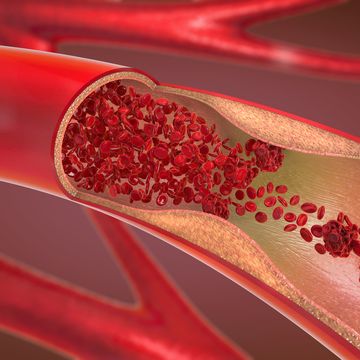Here's what happens when someone has a heart attack in a movie: The character (usually a man) winces in pain, grabs his chest, doubles over, and falls to the ground. While those incidents are certainly possible in real life, not all heart attacks follow that pattern. In fact, some people find out they’ve had an attack only after a subsequent one that sends them to the hospital.
“The definition of ‘silent heart attack’ is that someone has had heart damage but didn’t experience enough classic symptoms to go into the ER,” says Robert Greenfield, M.D., cardiologist and medical director of Non-Invasive Cardiology and Cardiac Rehabilitation at MemorialCare Heart & Vascular Institute at Orange Coast Medical Center in Fountain Valley, Calif. “Often, we only find out they happened after they’ve had a second heart attack and that first, silent one shows up in their test results.”
The silent attacks can even happen in your sleep without waking you up completely, he adds. For instance, you might be jarred awake at the end of the attack, but chalk it up to a bad dream or snoring.
The same risk factors for a typical heart attack also apply to a silent heart attack, according to Olujimi Ajijola, M.D., Ph.D., a cardiologist at Ronald Reagan UCLA Medical Center. High blood pressure, high cholesterol, diabetes, smoking, high stress levels, illicit substance use, and strong family history of heart attacks all make you more likely to have this kind of attack, he says.
“Diabetic patients may be at particularly high risk for silent heart attack because chronic diabetes causes degeneration of the heart’s autonomic nerves, which typically alert one to a heart attack,” adds Dr. Ajijola. “Also, women may have a higher risk of not recognizing the signs of a problem because they tend to have atypical symptoms for heart attacks, like abdominal pain, jaw discomfort, or just feeling generally unwell.”
Does that mean you can never tell if an attack is occurring, learning about it only later? Not at all. While they are more difficult—and certainly less cinematic—than a more major attack, there are some subtle signs your heart might be stressed. Here are some potential signs of a silent heart attack:
1. You’re suddenly short of breath.
The heart and lungs work together to make sure your blood has enough oxygen at all times, and when something goes wrong in your cardiovascular system, your breathing is usually affected immediately, according to Adriana Quinones-Camacho, M.D., a cardiologist at NYU Langone Health in New York. You might feel winded just walking across a room, or even not moving at all. Some people mistake this for a panic attack since that also tends to cause shortness of breath. But if you can’t “reset” yourself with deep breathing, or you feel like you simply can’t get enough air, you should probably get checked out.
2. Your heart starts racing.
When there’s a problem, your heart will immediately try to course correct, and that often means pumping faster, says Dr. Ajijola. There may also be a change in the way the upper chambers of the heart beat, causing arrhythmia, where it feels like your heart is skipping beats or banging against the wall of your chest.
3. Weakness and fatigue come on fast.
As your heart struggles to remedy whatever is happening, it will divert resources away from what it considers non-essential functions. That means muscles in your arms and legs, and that can cause a feeling of both weakness and heaviness. Dr. Greenfield says many people find it difficult to stand or walk at that moment, because they feel such an intense wave of fatigue.
4. You feel nauseous or have indigestion.
Another area of the body the heart considers non-vital when there’s trouble is your digestive system. As the resources are pulled from that area, it means there’s less oxygenated blood going into your bloodstream, and that can cause sudden nausea, indigestion, and abdominal cramps. This can be mistaken for heartburn, says Dr. Greenfield, because you may feel tightness and burning in the chest, similar to an acid reflux reaction.
5. Thoughts seem blurry.
Even though the heart makes sure the blood is number one on its list when problems occur, a silent heart attack happening because of a circulation issue might stop oxygen-rich blood from reaching the brain effectively. When that happens, you might feel dizzy, disoriented, confused, or have short-term memory struggles.
6. You just feel lousy.
This is the most challenging symptom of a silent heart attack, says Dr. Quinones-Camacho, because let’s face it, don’t we all feel lousy sometimes? You’re stressed, tired, a bit out of breath, distracted by your to-do list, have a little heartburn—for many people, this isn’t a silent heart attack, it’s just another Monday morning. But when that feeling is accompanied by a racing heart or overwhelming fatigue, it could be more than the usual blahs.
❗How to reduce your risk of silent heart attacks
People who’ve had silent heart attacks—whether they know it or not at the time—are at higher risk for another attack because of potential heart damage, Dr. Quinones-Camacho says. However, there’s quite a bit you can do to prevent that going down that road.
“Lifestyle changes make a huge difference, even if you have significant family history,” she states. “If it runs in your family, talk to your doctor, because it may make sense to start medications like statins. Also, find out your blood pressure and cholesterol numbers.”
From there, consider heart-healthy habits like eating more fruits and vegetables, getting more activity, lowering stress levels, getting enough sleep, and making time for social connections.
“The best part about focusing on heart health is that it has a ripple effect,” says Dr. Greenfield. “All these strategies to keep your heart strong can lead to having more energy, sleeping better, getting fit, and generally just enjoying your life more.”
Like what you just read? You’ll love our magazine! Go here to subscribe. Don’t miss a thing by downloading Apple News here and following Prevention. Oh, and we’re on Instagram too.
Elizabeth Millard is a freelance writer focusing on health, wellness, fitness, and food.













